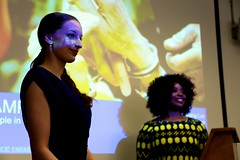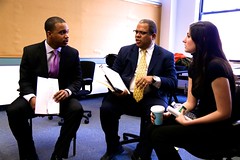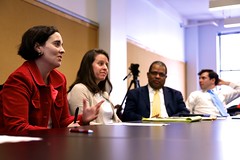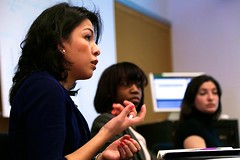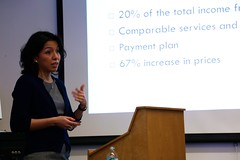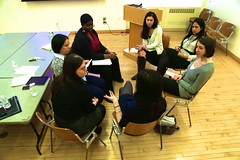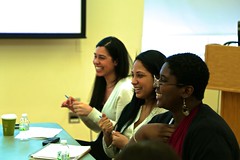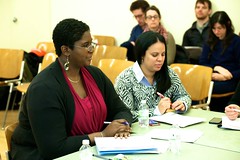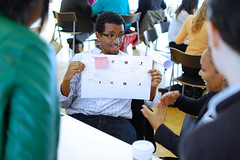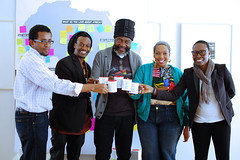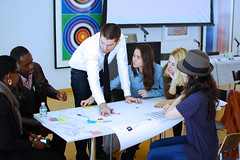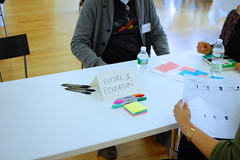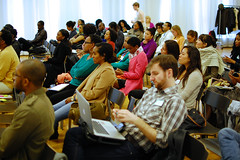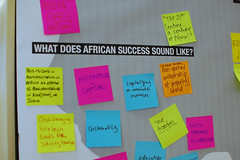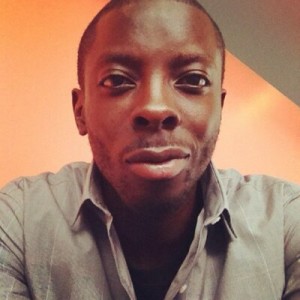 Ben Ndugga-Kabuye is a student in the Urban Policy Program at Milano. He holds a bachelors in Criminology, Law and Society from the University of Caliornia at Irvine, and is passionate about political advocacy. At Milano, Ben also works as a Project Assistant for the Urban Policy Program, and is involved in immigrant rights work. As a junior in college, Ben participated in the Public Policy and International Affairs Junior Summer Institute fellowship program in the summer of 2010.
Ben Ndugga-Kabuye is a student in the Urban Policy Program at Milano. He holds a bachelors in Criminology, Law and Society from the University of Caliornia at Irvine, and is passionate about political advocacy. At Milano, Ben also works as a Project Assistant for the Urban Policy Program, and is involved in immigrant rights work. As a junior in college, Ben participated in the Public Policy and International Affairs Junior Summer Institute fellowship program in the summer of 2010.
Want to be part of this series? Shoot us an email at [email protected].
Interview conducted by Molly Johnson
What sparked your interest in Urban Policy?
Urban Policy supplements a conversation on how communities address their needs that I have been fascinated with for a long time. There are different quantitative tools and theoretical frameworks that the program introduces you to, but it’s the conversation that drives my work. I am interested in interrogating the impact of policy, what motivates its genesis, and alternatives.
What inspired you to apply for the PPIA fellowship?
I was inspired to apply to the PPIA program initially because of a friend of mine I met my first year at UC Irvine. I was coming from community college so I did not have a freshman and sophomore cohort to connect with so I gravitated to older students who were already leaving and she had gone through PPIA and recommended it. I took her recommendation seriously because I had already gained a lot of respect for the tenacity of her perspective and the sincerity with which she conveyed her community in South Central Los Angeles as her inspiration. Connecting to her passion for her community I began to re-evaluate my definitions of community and what my life journey would look like in communion with those on whose shoulders I stood.
What made you choose Milano?
I was drawn to Milano partly because of its history of progressive thought. Ultimately students from marginalized communities who are thinking about social change must create community for survival and success in whatever academic setting they find themselves in. But there is something to be said about going to a place that has some basic understanding of the questions you are grappling with. Finally what made me choose Milano over the other schools that accepted me was the way they backed their progressive commitments with financial support. Creating a diverse student body and transforming the policy world means nothing without resource commitments. This is essential for all students but particularly critical for members of communities that have limited access to institutes of higher education.
How did the PPIA Fellowship prepare you for graduate school, particularly here at Milano?
PPIA at UC Berkeley introduced me to lifelong friendships with people who inspire to this day. The curriculum that had recently revamped by the tireless Assistant Dean Martha Chavez, gave me a clear sense of what the first semester of a masters program in policy would feel like. Familiarity unmasks misunderstanding disguised as fear. But ultimately PPIA gave me serious financial and preparatory support. I was prepared, trained, given material resources and that is the difference. My success stems from consistent unrelenting support from a fragile system of outreach to those who do not typically fill the ranks of policy makers.
Are there particular lessons you learned during your Fellowship that you have been able to apply in your studies at Milano?
Self-awareness is critical to navigating rigor. When you are self-aware you know your limits and strengths which enables you to see others as complements to you instead of as challenges. Increasing your self-awareness also helps you understand when you need to rest, when you need to rehabilitate yourself and how to make this journey sustainable and fulfilling. Many of the people who go through PPIA came through so much to arrive at that journey. When difficulty is all you know it is very hard to think about and develop your own support systems within and with others. Hard work is not the answer to everything, and that is a very difficult lesson. Especially when your mission is so grand it is very easy to think you are the totality of the vision when it is not your responsibility or even your capability to achieve it all. Humbling yourself and understanding your limits, focusing on rest, and building a community of support is irreplaceable.
What are your goals after graduation, and how has your education at Milano helped top prepare you?
My goal is to continue partnering with communities struggling to address difficult policy questions. I am currently working with an immigrant rights organization called the Black Alliance for Just Immigration (BAJI) and we are doing very exciting things. People who are affected by and deal with terrifying policies surround me. We are able to sit together, imagine together, and create an alternative vision. My goal is to continue this work, and Milano has been critical to thinking through how to amplify the work BAJI is doing. I step into the organization thinking about how I can enhance our capacity and help our members build a supportive and critically engaged community.
Can you tell us more about your work with immigrant rights?
My work at BAJI involves building local and national coalitions between Black immigrants and African-American communities to introduce economic justice and racial equity to the policies affecting our members. This requires understanding the stakeholders in the policy field and establishing links between a range of organizations That type of work is central to the Milano curriculum. At BAJI we have two current campaigns you can learn about and potentially participate in. Locally our ICEFREENYC campaign works to end collaboration between NYC agencies and Immigration and Customs Enforcement. Our second campaign is an effort to create a Haitian Family Reunification Parole Program to reconnect Haitian-American’s with family members in Haiti. Building campaigns, addressing policy makers, and leveraging collective power is a major part of my introductory and advanced coursework.




